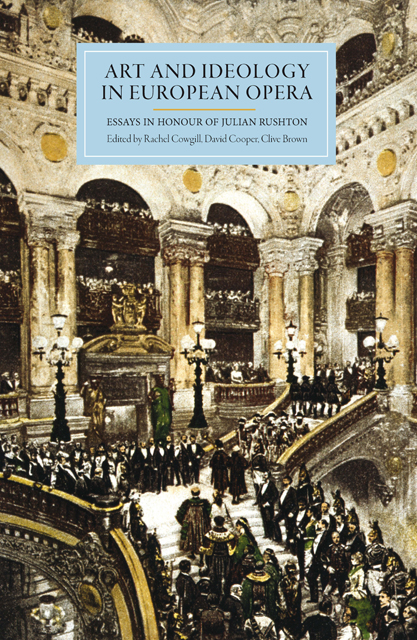Book contents
- Frontmatter
- Contents
- List of Figures
- List of Music Examples
- List of Tables
- Notes on Editors and Contributors
- Acknowledgements
- Introduction
- I Nationalism, Cosmopolitanism and National Opera
- II Opera, Class and the Politics of Enlightenment
- III Opera and Otherness
- Julian Rushton: A Family Memoir
- 7 The Works of Julian Rushton
- Index
- Tabula Gratulatoria
1 - ‘Studying a little of the French Air’: Louis Grabu’s Albion and Albanius and the Dramatic Operas of Henry Purcell
Published online by Cambridge University Press: 28 February 2023
- Frontmatter
- Contents
- List of Figures
- List of Music Examples
- List of Tables
- Notes on Editors and Contributors
- Acknowledgements
- Introduction
- I Nationalism, Cosmopolitanism and National Opera
- II Opera, Class and the Politics of Enlightenment
- III Opera and Otherness
- Julian Rushton: A Family Memoir
- 7 The Works of Julian Rushton
- Index
- Tabula Gratulatoria
Summary
Louis Grabu's setting of John Dryden's Albion and Albanius enjoyed the briefest of lives on the English Restoration stage: a total of six performances in June of 1685. This circumstance might suggest that its influence was equally short lived and inconsequential. At first glance this seems to be a reasonable conclusion: no other new through-composed opera appeared upon the professional London stage for another fifteen years and the work's French-style music soon became thoroughly outdated. Yet even one of its most hostile modern detractors admits that the opera exerted some influence on Purcell. The degree and specific nature of this influence, however, has gone largely unexamined. Edward J. Dent reckoned that ‘there can […] be little doubt that Purcell studied the score with discriminating attention, for there are a few passages that can often and easily be paralleled in the English composer's operas’, but he offers only cursory suggestions as to what these might be. Peter Holman concludes that Purcell ‘borrowed some superficial features of Grabu's music’, while Martin Adams suggests that ‘Dioclesian is indebted in concept and detail to a few definable models, notably Grabu's Albion and Albanius’, though once again, these details are for the most part unspecified. Curtis Price, examining Albion and Albanius in the context of his discussion of Dioclesian, provides the most detailed description of what he considers to be the evidence of Grabu's influence on Purcell: the style of a series of grand choruses and heroic arias in the dramatic opera's second act, the ground ‘Triumph victorious Love’ and the ‘blandness’ of many of Dioclesian's numbers. Yet even here the particulars are sketchy.
This chapter seeks to provide a more complete picture of the ways in which the music and, crucially, the production of Albion and Albanius affected Purcell and his dramatic operas, Dioclesian in particular.
- Type
- Chapter
- Information
- Art and Ideology in European OperaEssays in Honour of Julian Rushton, pp. 12 - 39Publisher: Boydell & BrewerPrint publication year: 2010



